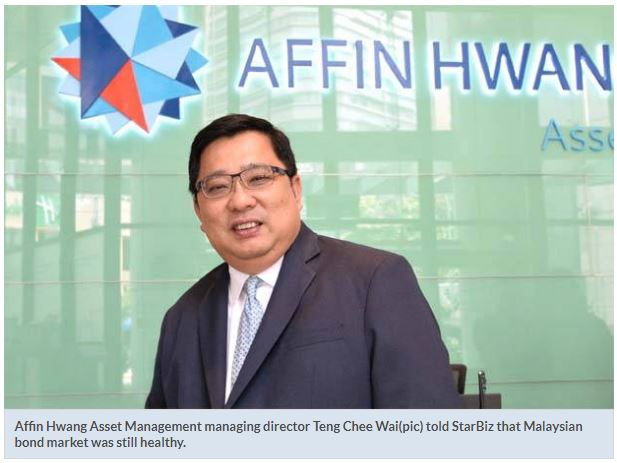Malaysian Investors told to put more money in bonds
GEORGE TOWN: Malaysian investors should have an investment portfolio comprising 70% bonds and 30% equities.
Affin Hwang Asset Management managing director Teng Chee Wai told StarBiz that Malaysian bond market was still healthy.
He spoke at the Affin Hwang Asset Management Investment Forum 2019: Wealth & Beyond.
“Our bonds are among the single A-rated bonds in the world today offering the highest yield at about 3.3% per annum.
“Because of weak corporate earnings and negative geopolitical news flowing around, the equity market is weak, ” he added.
According to Teng, foreign investments into Malaysia turned positive in June, totaling RM6.6bil.
“Malaysian Government Securities (MGS) was the primary driver with inflows of RM5.8bil.
“This brings the total foreign holdings in domestic debt to RM182.6bil, ” Teng added.
Teng said in general bonds provided regular income.
“In 24 years of negative equity returns from 1929-2017, bonds only had three years. Bonds have never had two years of consecutive negative returns, ” he added.
Investors usually look for a return of 6% to 7% per annum, according to Teng.
In Malaysia, Teng said revenue was running ahead of estimates due to stronger sales and services tax collection and voluntary disclosure programme.
“Operating expenditure is also better than estimates, while fiscal disciplinary measures provide further support for the ringgit, ” he said.
On local stocks, Teng recommended Yinson Holdings Bhd  and MY E.G. SERVICES BHD
and MY E.G. SERVICES BHD  .
.
“Yinson, a floating, production, storage, and offloading service provider, has a healthy order book.
“The government plans to expand the digital sector should benefit MY E.G., which provides electronic government solutions and services in Malaysia, ” Teng said.
On investing in currencies, Teng said if China allowed its currency to slide further, the Asian currencies would depreciate correspondingly.
“The US dollar, Yen, and Swiss Francs would then become the safe havens, ” he added.
On the impact of the inverted yield curve, Teng said he did not foresee a forthcoming recession.
“A recession will not happen inevitably because of the inverted yield curve.A recession is also not forthcoming because central banks are cutting interest rates.
“However, the global economy is slowing down, ” Teng added.
On China, Teng said the country might not stimulate its economy.
“Not that China doesn’t have the funds to do so.
“China would probably not stimulate because there is no advantage of doing so, as the market is weak, and such a move would only benefit others, ” he said.
Teng added that Malaysia was one of the beneficiaries of the US and China trade war.
“We are seeing the relocation of plants from China to this region.
“Malaysia should benefit from this move, although it has to compete with Vietnam, ” he added.
Source: https://www.thestar.com.my/business/business-news/2019/08/26/malaysian-investors-told-to-put-more-money-in-bonds#veZCPDuazJzhu7L8.99


 English
English




